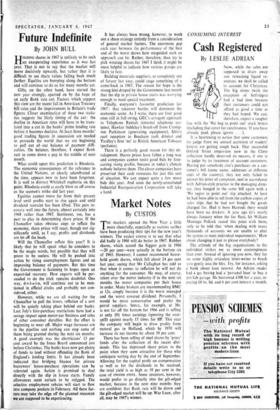Future Indefinite
By JOHN BULL
HOLDING shares in 1967 is unlikely to be such Elan exasperating experience as it was last year. That is not to say that the market will move decisively upwards, but rather that it is difficult to see share values falling back much farther. Equities are bumping along the bottom and will continue to do so for many months yet.
Gilts, on the other hand, have started the new year strongly, spurred on by the hope of an early Bank rate cut. Factors which support this view are the recent fall in American Treasury bill rates and the improvement in Britain's trade figures. Closer examination- of these two statis- tics suggests the likely timing of the cut: the decline in American rates will have to be trans- lated into a cut in the banks' prime lending rate before it becomes decisive. At least three months' good trading figures in succession are needed to persuade the world that we are beginning to pull out of-- our balance of payment diffi- culties. On balance, therefore, I expect Bank rate to come down a peg in the middle of next month.
What could upset this prediction is Rhodesia. The economic consequences of the reference to the United Nations, so clearly adumbrated at the time, appears now to have been forgotten. It is well to distrust Whitehall euphoria on this point. Rhodesia could as easily blow us off course as the seamen's strike did last year.
Equities cannot move far from their present level until profits start to rise again and until dividend restraint has been lifted. This puts re- covery well into the future, almost certainly into 1968 rather than 1967. Sentiment, too, has a part to play in determining share prices. If the Chancellor takes obvious steps to reflate the economy, share prices will react, though not sig- nificantly until, as I say, profits and dividends are let off the leash.
Will the Chancellor reflate this year? It is likely that he will speak what he considers to be the magic words, but possible that they will prove to be useless. He will be pushed into action by rising unemployment figures and an improving balance of payments. But this time the Government is fastening its hopes upon an export-led recovery. How exports will be per- suaded to do the trick remains doubtful. One way, d-v-l-a-i-n, will continue not to be men- tioned in official circles and probably not con- sidered, either.
However, while we are all waiting for the Chancellor to pull the levers, reflation of a sort will be quietly taking place behind our backs. Last July's hire-purchase restrictions have had a savage impact upon motor-car business and sales of other consumer durables. But the effect is beginning to wear off. Major wage increases are in the pipeline and nothing can stop' some of them being granted during the next six months. A good example was the electricians' 13 per cent award by the Jones Board announced just before Christmas. The banks have now got plenty of funds to lend without offending the Bank of England's lending limits. It has already been indicated that bridging finance for private borrowers' house-purchase ,operations can be tolerated again. Action is promised to deal directly with the dip in house starts. Family allowances seem certain to be rejigged. The selective employment rebates will start to flow into company pockets in February. All these fac- tors-may take the edge off the planned recession we are supposed to be experiencing. It has always been wrong, however, to work out a share strategy entirely from a consideration of general market factors. The enormous gap each year between the performance of the best and of the worst shows how misguided such an approach can be. Rather, therefore, than try to pick winning shares for 1967 I think it might be more helpful to indicate how various groups are likely to fare.
Building materials suppliers, so completely out of favour last year, could stage something of a come-back in 1967. The reason for hope is the strong hint droped by the Government last month that the dip in private house starts was worrying enough to need special treatment.
Finally, everyone's favourite prediction for 1967: that takeover battles will dominate the economic scene. As I write, there are four good ones still in full swing, GEC's arrogant approach to Telephone Rentals (internal telephone sys- tems), Hawker Siddeley's brush-off from Cromp- ton Parkinson (generating equipment), Idris's cool reception to Beecham (soft drinks) and Yardley's firm `no' to British American Tobacco (perfume).
There is a perfectly good reason felt this de- velopment. Shares prices have fallen a long way and companies cannot resist good bids by fore- casting rising profits, because in today's climate nobody believes them. The clever companies have preserved their cash resources for just this sort of situation. We can expect quite a few more bids this year. And soon the newly-constituted Industrial Reorganisation Corporation will take a hand.






























 Previous page
Previous page